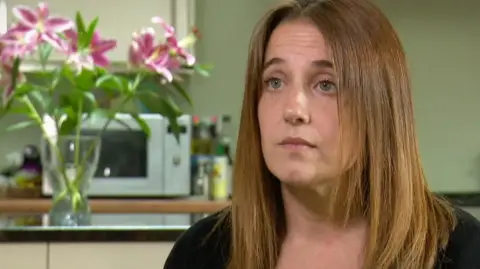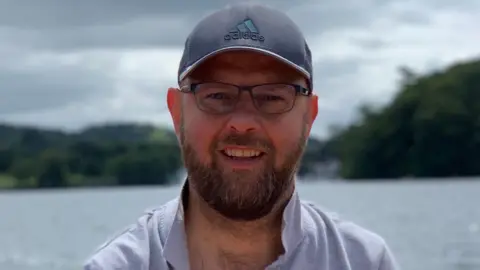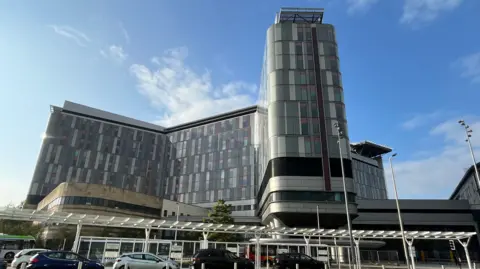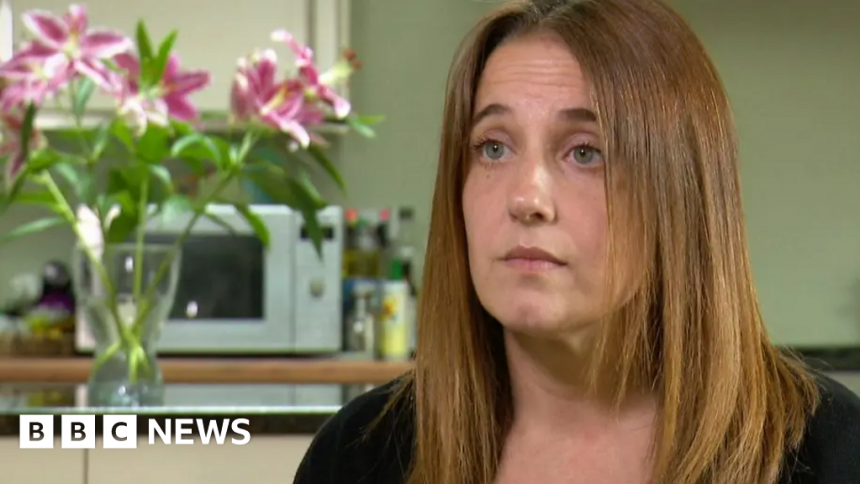Widow accuses health board of ‘letting families down’ over deaths
 BBC
BBCThe widow of a Scottish government official who died after contracting Covid while undergoing cancer treatment has accused a health board of letting her and other families down.
Andrew Slorance contracted the virus while he was a patient at the Queen Elizabeth University Hospital (QEUH) in Glasgow in 2020.
His wife Louise, who will later give evidence to the Scottish Hospitals Inquiry, has repeatedly said the truth surrounding her husband’s death has been “covered up” to protect the hospital’s reputation.
NHS Greater Glasgow and Clyde said it wanted to assure patients, families, staff and the public that its hospitals were safe, but would not comment further while the inquiry was ongoing.
Mr Slorance, who died aged 49, had gone into hospital in October 2020 for a stem cell transplant and chemotherapy after being diagnosed with mantle cell lymphoma.
He died six weeks after being admitted, with the official cause of death listed as “Covid pneumonia”.
Prior to his death, Mr Slorance was head of the Scottish government’s response and communication unit, which was responsible for its handling of the Covid pandemic.
Former first minister Nicola Sturgeon described Mr Slorance, a father of five, as a “wonderful person”.
Mrs Slorance has maintained that mistakes were made over her husband’s care.
When she requested his medical notes after his death, she found he had also been treated for a fungus called aspergillus, which had not previously been disclosed to her.
She believes that the £840m QEUH, which was under pressure prior to the pandemic due to the deaths of several patients from bacterial infections, had been protected from further criticism.

Mrs Slorance also accused the NHS Greater Glasgow and Clyde (NHSGGC) health board of “hiding the truth” over her husband’s death.
She will give evidence to the inquiry alongside other families whose loved ones died at the hospital.
In a statement released ahead of her evidence, she said: “We placed our trust in the health board and the hospital to keep our loved ones safe, they not only let our families down, but the health board added to our trauma by hiding the truth.
“We have fought for every scrap of paper we have received, our grief suspended while we fight for the truth.
“Today, years after their deaths, we finally have the opportunity to describe the lengths that NHS Greater Glasgow and Clyde went to, to stop us knowing the events leading up to the deaths of our husbands and mums.”

The public inquiry is investigating the link between construction of the hospital campus and safety issues experienced by patients.
The campus was built in 2015, but concerns were raised over the safety of water and ventilation systems.
Milly Main, a 10-year-old who was diagnosed with leukaemia in 2012, died in 2017 after contracting stenotrophomonas at the campus.
A 10-year-old boy and a 73-year-old woman also died after contracting a cryptococcus infection, linked to pigeon droppings, while being treated at the hospital.
The inquiry is being chaired by Lord Brodie KC and is examining issues at both the QEUH campus in Glasgow, and the Royal Hospital for Children and Young People (RHCYP) and Department of Clinical Neurosciences in Edinburgh.
‘Our trauma cannot end’
Several other families are scheduled to give their evidence to the inquiry.
Tony Dynes also died in the hospital while receiving treatment for cancer.
Like Mr Slorance, his medical records showed he had a positive culture of aspergillus prior to his death in May 2021.
His widow Maureen Dynes will be among those to share their experiences.
Meanwhile, Beth and Sandie Armstrong, daughters of Gail Armstrong, said she suffered with a cryptococcus infection in November 2018.
She died in January 2019, shortly before the hospital announced there had been another death due to the bacteria.
Her death is being investigated by Police Scotland as part of a corporate homicide claim against NHSGGC.
In a joint statement, the families demanded that high-risk patients be transferred to “alternative and safe” new hospitals in order to protect them while the investigation continues.
They said: “Our trauma cannot end while untruths prevail and, justice and accountability has yet to be served.
“Knowing full well the pain and trauma that has come with our family member’s avoidable death, we cannot risk other families suffering the same.”
A spokesperson for the Greater Glasgow and Clyde health board said the safety of its hospitals was “clearly evidenced” by publicly available indicators of safety, collected and monitored at a local and national level.
They said: “Mandatory surveillance of Healthcare Associated Infections (HAIs) demonstrates NHSGGC consistently performs better than many other boards across Scotland and mortality rates at the QEUH campus are in line with and at times lower than the Scottish average.
“The Scottish Hospitals Inquiry has heard from key expert individuals including a number of NHSGGC staff who have provided evidence in relation to hospital safety and infection prevention and control procedures and this is the place to consider these matters. We will continue to support the inquiry to fully establish the facts. As this is an ongoing inquiry, we will not comment any further on these issues.
“We extend our sympathies to any families who have lost loved ones in our care and all those affected during the inquiry.”






